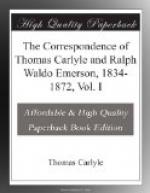----------- * Emerson’s estimate of Mr. Ripley was justified as the years went on. His Life, by Mr. Octavius Frothingham,—like his father, “a worthy and accomplished, man,” but more like Luther than Erasmus,—forms one of the most attractive volumes of the series of Lives of American Men of Letters.
** The late Ellis Gray Loring, a man of high character, well esteemed in his profession, and widely respected. ----------
On the other hand, I make no doubt you shall be sure of some opposition. Andrews Norton, one of our best heads, once a theological professor, and a destroying critic, lives upon a rich estate at Cambridge, and frigidly excludes the Diderot paper from a Select Journal edited by him, with the remark, “Another paper of the Teufelsdrockh School.” The University perhaps, and much that is conservative in literature and religion, I apprehend, will give you its cordial opposition, and what eccentricity can be collected from the Obituary Notice on Goethe, or from the Sartor, shall be mustered to demolish you. Nor yet do I feel quite certain of this. If we get a good tide with us, we shall sweep away the whole inertia, which is the whole force of these gentlemen, except Norton. That you do not like the Unitarians will never hurt you at all, if possibly you do like the Calvinists. If you have any friendly relations to your native Church, fail not to bring a letter from a Scottish Calvinist to a Calvinist here, and your fortune is made. But that were too good to happen.
Since things are so, can you not, my dear sir, finish your new work and cross the great water in September or October, and try the experiment of a winter in America? I cannot but think that if we do not make out a case strong enough to make you build your house, at least you should pitch your tent among us. The country is, as you say, worth visiting, and to give much pleasure to a few persons will be some inducement to you. I am afraid to press this matter. To me, as you can divine, it would be an unspeakable comfort; and the more, that I hope before that time so far to settle my own affairs as to have a wife and a house to receive you. Tell Mrs. Carlyle, with my affectionate regards, that some friends whom she does not yet know do hope with me to have her company for the next winter at our house, and shall not cease to hope it until you come.




